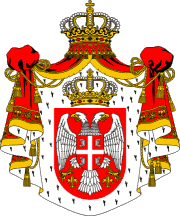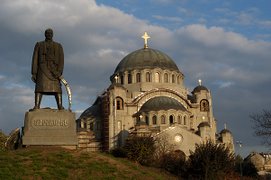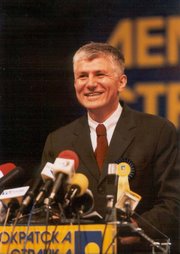Slovenia Forcibly Removes Its Undesirables
A frequent Balkan news commentator and reporter Nicholas Wood (who probably can’t remember what he had for breakfast, but won’t forget to mention, in one way or the other, that Serbs are guilty for just about everything) will tell you the violent outbursts of racism exhibited in former Yugoslav republic of Slovenia are something rather new and unexpected.
In his latest article about the forceful expulsion of Roma families, threats, violence and even murder of Gypsies by the Slovenians who simply don’t want anyone with darker skin or non-Slovenian living among them, Nicholas’ shock and disbelief is almost palpable, from the title (Hounding of Gypsies Contradicts Slovenia’s Image) down:
Half a mile short of this picturesque village in central Slovenia, two brick houses and a cluster of sheds lie empty. A baby’s stroller sits abandoned outside, and chickens and geese race about, apparently unfed, all evidence of a rapid departure by the family that lived here until just over a week ago.
The Strojans, an extended family of 31 Gypsies, 14 of them children, fled the property on Oct. 28, after it was surrounded by a mob from Ambrus and nearby villages, threatening to kill them and demanding their eviction. While the police kept the crowd back, Slovenian government officials negotiated the family’s removal to a former army barracks about 30 miles away.
The scene is at odds with an image of Slovenia as the most advanced and wealthiest of the 10 Eastern European states that joined the European Union two years ago. Slovenia prides itself as being free of the ethnic tensions that dominate the rest of Yugoslavia, from which Slovenia broke free in 1991 after a 10-day conflict. Since then Gypsies, also known as Roma, have been the victims of sporadic assaults, including a grenade attack last year in which two women, a mother and her 21-year-old daughter, were killed.
While none of the Strojans were seriously hurt in the incident here, rights groups say the government’s role in the forced removal of the family makes it one of the most serious such incidents in Europe in a decade. And now other municipalities are calling for the removal of Gypsies.
“Gypsies Raus!”
The reporter also notes that the Gypsies from the Slovenian Ambrus village had to flee to the woods where they were hiding from the region’s angry mob. When they tried to go back home...
...“People were coming on foot through the woods, they were shouting, ‘Kill the Gypsies, kill the Gypsies!’ ” said Miha Strojan, Mr. Strojan’s brother. He said he remembered someone shouting, “We’ll string you up on a cross!” Photographs that Borut Peterlin, a local photographer, took of the crowd show both menace and boisterous spirits, with people laughing.
...[when Slovenian government officials informed the crowd Gypsies will be removed from their village] “They were singing the national anthem and other songs,” Mr. Peterlin said. “There were also shouts of, ‘Gypsies raus!’ ” he said, echoing a taunt used by the Nazi’s during the deportation of Jews and Gypsies during the Holocaust.
But none of this helps remove the cobwebs from Nicholas Wood’s eyes -- he’s still entranced with Slovenia’s alleged advancement and wealth, and enamored with the fact Slovenia was allowed to join the European Union (Fourth Reich) two years ago, as if that in itself has inoculated Slovenians from racism and has given them some kind of eternal perfect alibi no matter what.
Slovenian Racism Doesn’t Count
On top of everything, despite the fact that Serbia remains the only truly multi-cultural Balkan country with the greatest number of minorities, including Gypsies who have an equal status to all the citizens of Serbia and often seek shelter among Orthodox Serbs in regions where Muslim violence is rampant (like in occupied Kosovo and Metohija province), in a story that has absolutely no connection to Serbia or Serbs, neither Nicholas Wood, nor the Slovenian human rights activist Matjaz Hanzek have resisted the urge to point their fingers at Serbs:
According to Slovenia’s ombudsman for human rights, Matjaz Hanzek, the government and public reaction illustrate a deep-rooted prejudice that permeates Slovenian society. “They really don’t understand they are using discriminatory speech,” he said in an interview. “Our neighbors are watching this very closely. If this can happen here in the European Union, then nationalist groups in countries like Serbia and Croatia will know they can get away with the same.”
So, according to this fine reporter and Slovenian human rights activists, Slovenians simply don’t know what they are doing (forget the speech, look at the actions for a change) and they don’t understand the words coming out of their own mouths -- they are just stupid, ignorant or, at best, infantile; but, unlike Serbs, innocent in any case. Advanced, wealthy, fresh little Europeans, their only sin being that they are setting a bad example for their troglodyte neighbors, mainly backward Serbs, who will now use these fascist outbursts of their better-in-every-way Europeanized neighbors and start expelling Gypsies, Muslims, Jews, Croats, Romanians, Hungarians, Bulgarians, Montenegrins, Gorani, Armenians, Turks, Egyptians and every other of few dozens of minorities living with Serbs for generations. THAT’s the only problem here, see, since Slovenian racism really doesn’t exist -- it can’t, they’re the members of the European Union, and Clinton went there immediately after he bombed Serbia back into the stone age, to tell Slovenians what a good example they are for the rest of us, remember?
Despite the fact that impoverished Serbia hosts the greatest numbers of refugees from all the regions of former Yugoslavia, despite the fact that there was no retaliation and nobody was expelled from Serbia by the Serbs, not even during the wars when Croats ethnically cleansed up to 400,000 Krajina Serbs, when mujahedeen from all over the world were waging a jihad on Bosnian Serbs and rivers of refugees of all confessions and ethnicities were pouring into Serbia, nor when Serbia was bombed by the 19 wealthiest nations in the world on behalf of Albanian minority’s terrorist KLA and both Albanians and Kosovo Serbs were running into Serbia proper... despite all that, western mainstream reporters and Slovenians have the nerve to hold sermons to Serbs, suggesting that now, when they get to see how the Fourth Reich Slovenians are expelling their Gypsies, there is a real danger the Serbs will start doing the same.
Slovenia Prefers Administrative Genocide: The Erased
“We want Serbia to ...follow the path that Slovenia has chosen, where people reach across the old divides and find strength in their differences and their common humanity,” Bill Clinton on his post-bombardment visit to Slovenia. June 21, 1999.
In reality, Slovenians have given the entire world a score of despicable examples regarding the human rights and their violations on a mass scale, revealing that “Slovenia’s image” is nothing but a thin glaze of varnish covering deeply rooted rabid nationalism and racism. The latest Nazi flare-up and the expulsion of Gypsies is far from being the new and surprising ‘incident,’ rather it’s the continuation of the old story - much older then Slovenian state (read “Tito’s Flawed Legacy” by late Nora Beloff, Balkan expert par excellance and former chief political correspondent of the London Observer).
If Nicholas Wood and the likes ever decide to take their blindfolds off, they’ll have no difficulties learning about the so called ”soft genocide” or “administrative ethnic cleansing” Slovenian government undertook immediately after unilateral declaration of independence. While nothing similar has ever occurred in Serbia during its thousand years old statehood, this dastardly act by Slovenians (similar to the way Croatia treats its refugees), has ensured Slovenia’s ethnic purity and is better known as Izbrisani -- The Erased Citizens of Slovenia:
On February 26, 1992, the newly independent state of Slovenia deleted the names of some 30,000 residents from the nation’s civil registries. The targeted population, which came to be known as izbrisani (erased residents) were not of Slovenian ancestry, but were so-called ‘new minorities’ including ethnic Serbs, ethnic Croats and ethnic Bosnian Muslims, ethnic Albanian Kosovars and ethnic Roma which the government sought to force out of the country. (In contrast ‘old minorities’ include ethnic Italians and ethnic Hungarians, specifically mentioned in the December 1991 Constitution.)
Twelve years later the Slovenian Government has still not yet acted to fully redress this massive violation of human rights. Critics of this radical action by the Slovenian government have sometimes characterized the mass erasure as ‘soft genocide’ or ‘administrative genocide.’ A more appropriate term is probably ‘administrative ethnic cleansing’ or ‘civil death.’ By whatever description, redress for the mass ‘erasure’ is still badly needed. In other historical contexts this kind of radical action which in and of itself is a massive violation of human rights, has been a step toward more extreme actions including mass expulsion and even genocide. In the case of Slovenia, the izbrisani were targeted for elimination solely on account of the non-Slovene groups into which they were born. Furthermore, this ‘administrative ethnic cleansing’ on February 26, 1992 in Slovenia can be viewed as a contributing factor to the radicalization in former Yugoslavia which only a few months later saw violent ethnic cleansing in Bosnia and Herzegovina.
The policy of “mass erasure,” which could also be called mass denationalization, must especially be condemned because it was a partially successful policy, causing over one-third (12,000 out of 30,000) of the targeted population to leave Slovenia. When officials asked an izbrisani for his old Yugoslav passport the top right corner would be cut off, making the document useless and marking the bearer for further discrimination. The izbrisani (erased residents) were not forced out at gunpoint and their homes were not burned down as in Bosnia, nevertheless they lost their jobs, medical benefits and sometimes were deported for minor offenses. The multiple possible translations of the term “izbrisati” (erase, red pencil, rub out, score out, scratch out, delete, expunge, obliterate) shows the impact the policy might have on a person. In Slovenia, seven izbrisani committed suicide. Ultranationalist politicians characterized the izbrisani as war criminals, swindlers and undesirables.
The radical ‘mass erasure’ of February 26, 1992 took place eight months after Slovenia declared independence from Yugoslavia on June 25, 1991. The erasure occurred just days after Slovenian Athletes participated for the first time in Olympic competition at the XVI Winter Olympic in Albertville, France. Acceptance into the United Nations was still three months away (May 22, 1992). Notably, Slovenia was not at war at the time the ‘mass erasure’. The previous summer war with Yugoslavia had lasted only a few weeks ending a with European Union sponsored agreement calling for withdrawal of Yugoslav Federal troops from Slovenia and the demobilization of Slovenian troops. Furthermore the ‘mass erasure’ came after the completion of a new Constitution is which Slovenia committed itself to protect human rights and fundamental freedoms (Article 5, and Articles 61 to 63).
In other words, if Slovenian human rights activists are correct and Slovenians really don’t know what are they doing, the UN, EU, and everybody else who welcomed them into their elite clubs in spite of such an appalling evidence of pure racism in all segments of society, up to the highest, state level, should have known better. Clintons included.
Following the fate of Strojan family is a photographer Borut Peterlin, who took the picture of Strojan children above and was also cited in the article by Nicholas Wood. Borut is collecting links about the unfortunate Gypsy family from around the world, along with various commentary, like the one presented here.
Visiting the new, independent Slovenia, Peter Handke wrote:
Now... I arrived at the Hotel 'Zlatorog' ... at the valley's end, everything arranged for German speakers, and in the entrance the framed photos of Tito's visit had been removed not a pity really and replaced with those of Willy Brandt.... On state television almost nothing other than German and Austrian channel over and over again a foreign trade or economic delegation was having native folk songs sung to them. Then the Slovenian President would enter the scene. Wasn't he once a capable and proud functionary? But now he behaves like a waiter, almost like a lackey, who serves up his country to the foreigners who visit, as if he wanted to satisfy every wish of a German employer or customer: the Slovenians aren't this or that, but rather a 'hard working and willing Alpen people'. A Journey to the Rivers: Justice For Serbia
The first question that Handke heard a customer in the new supermarket ask, was: "Has The Bild (German newspaper) arrived?"
Likewise, the Independent State of Croatia II (NDH II), never bothered to curtail its rather embarrassing enthusiasm for the opportunity given by Germany, Vatican and the West in general to turn the clock back and revert to the ethnically clean German satellite. Quite the contrary. From the fateful 1991 when Tudjman's Croatia proudly unveiled the dusted off insignia from its fascist slice of heaven with the spontaneous burst into a collective Danke Deutschland song - the absolute worst, prime example of the kitsch, tastelessness and shameless sycophancy ever recorded in the history of humanity - till today, Croatia has been cheerfully sliding back in time, to the abominable 1940's.
The renowned Balkan expert, Diana Johnstone, wrote in September of 1999:
When I visited Croatia three years ago, the book most prominently displayed in the leading bookstores of the capital city Zagreb was a new edition of the notorious anti-Semitic classic, "The Protocols of the Elders of Zion". Next came the memoires of the World War II Croatian fascist Ustashe dictator Ante Pavelic, responsible for the organized genocide of Serbs, Jews and Romany (gypsies) that began in 1941, that is, even before the German Nazi "final solution".
However, if the Croatian fascists actually led, rather than followed, the German Nazis down the path of genocide, that doesn't mean they have forgotten their World War II benefactors. After all, it was thanks to Hitler's invasion of Yugoslavia that the "Independent State of Croatia" was set up in April 1941, with Bosnia-Herzegovina (whose population was mostly Serb at the time) as part of its territory. And the hit song of 1991, when Croatia once again declared its independence from Yugoslavia and began driving out Serbs, was "Danke Deutschland" in gratitude to Germany's strong diplomatic support for Zagreb's unnegotiated secession.
In the West, of course, one will quickly object that the Germany of today is not the Germany of 1941. True enough. But in Zagreb, with a longer historical view, they are so much the same that visiting Germans are sometimes embarrassed when Croats enthusiastically welcome them with a raised arm and a Nazi "Heil!" greeting.
So it should be no surprise that this year's best seller in Croatia is none other than a new edition of "Mein Kampf". This is not a critical edition, mind you, but a reverently faithful reproduction of the original text by that great European leader, benefactor of Croatian nationalism and leader of the Third Reich, Adolf Hitler.
The magazine "Globus" reported that "Mein Kampf" is selling like hotcakes in all segments of Croatian society. For those who want to read more, there is a new book entitled "The Protocols of Zion, the Jews and Adolf Hitler" by Mladen Schwartz, leader of the Croatian neo-Nazi party New Right, and "Talks with Hitler" by the Fuhrer's aide Herman Rauschning, as well as various other memoires celebrating the Ustashe state whose violent massacres of Serbs shocked the Italian fascist allies and even German diplomatic observers at the time. (Nazi Nostalgia In Croatia, by Diana Johnstone)
Of course, the fact that Pope John Paul II went to Croatia in October of 1998 to beatify Aloysius Stepinac who openly supported Nazi regime and Croatia's bloody pogroms by inviting clergy to help the Ustasha efforts in cleansing the country from 'Serbian schismatics', Jews and Gypsies in the name of "faith" has hardly helped Croats come to terms with their monstrous past. Neither does this sort of negative encouragement by Vatican promote civilized (or Christian) behavior which would finally allow, 15 years later, over a quarter of a million Serbs they purified the Independent State of Croatia II from, those who survived the "Operation Storm" and "Lightning", to return to their land in Krajina and rebuild their burnt, bulldozed and stolen homes. The same Pope who refused the invitation by Patriarch of the Serbian Orthodox Church, His Holiness Pavle, to hold a joint commemoration to almost a million victims of Croatia's Nazi madness in Jasenovac, on its 50 years anniversary in 1995, has rushed to beatify the one who gave blessings to the pogroms, in the name of Roman Catholic church. No wonder the clock is turning back to the time of the rule of the Beast.







